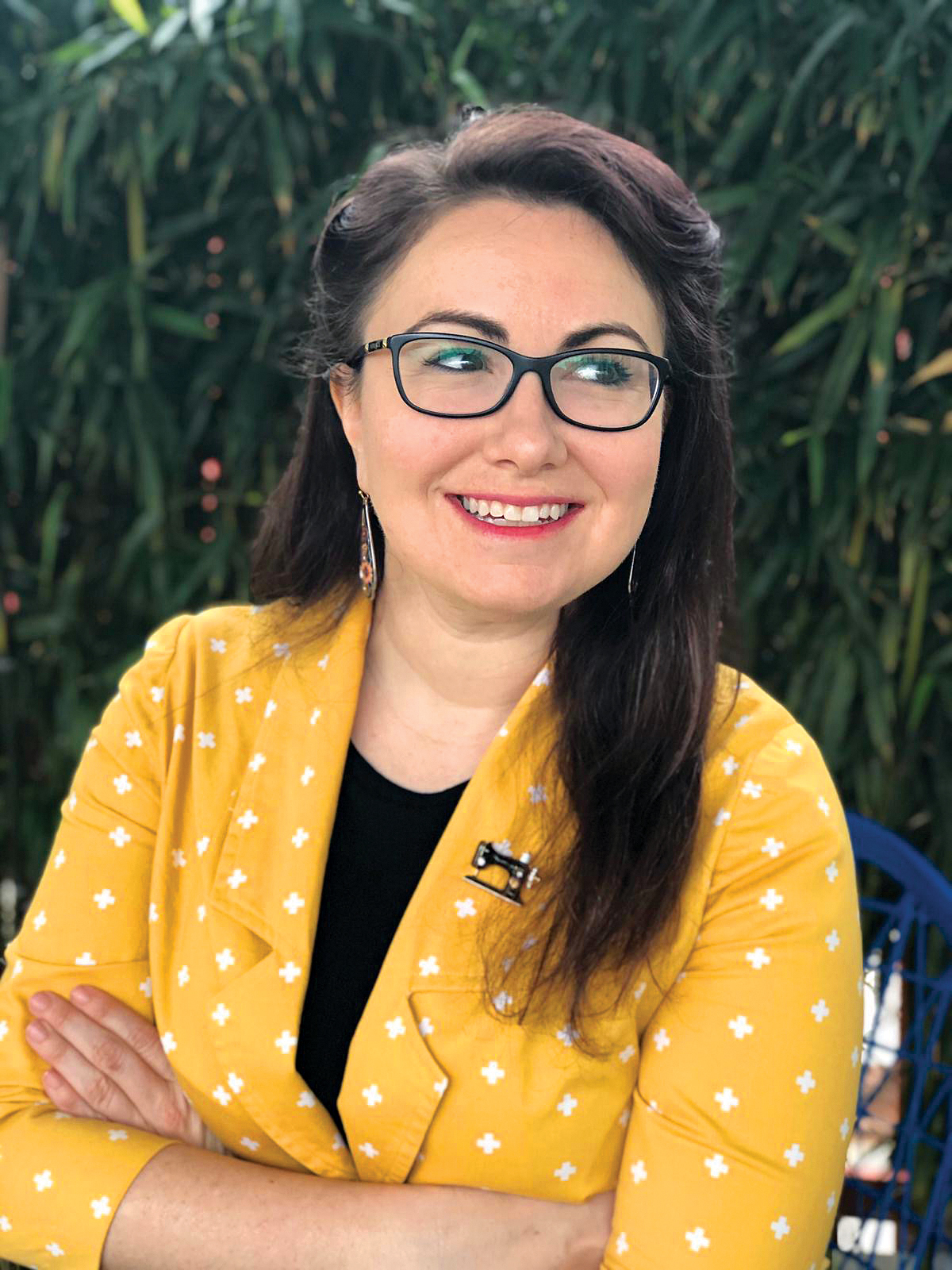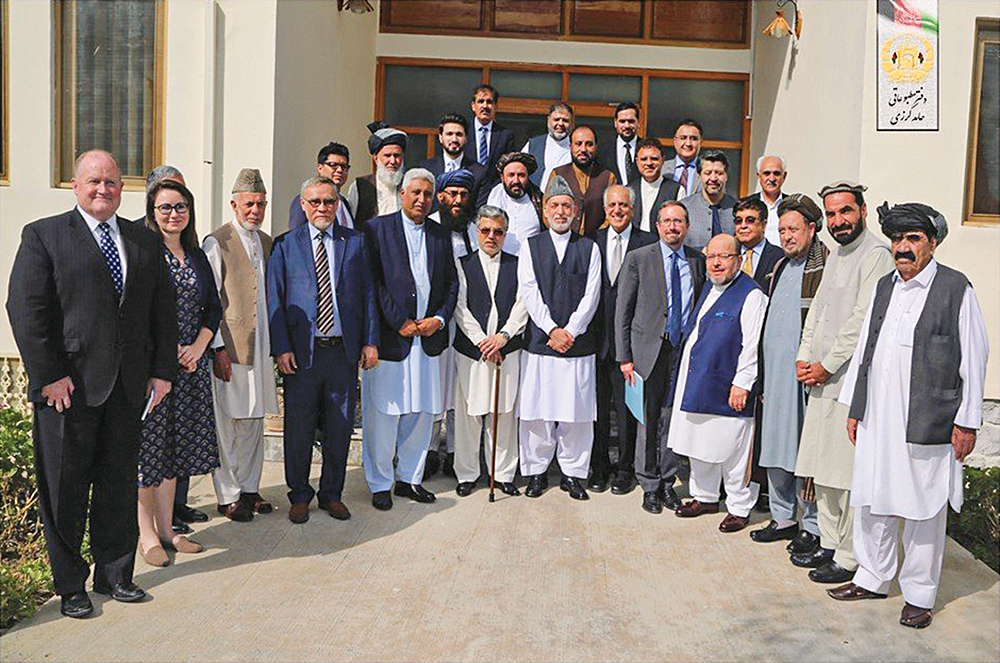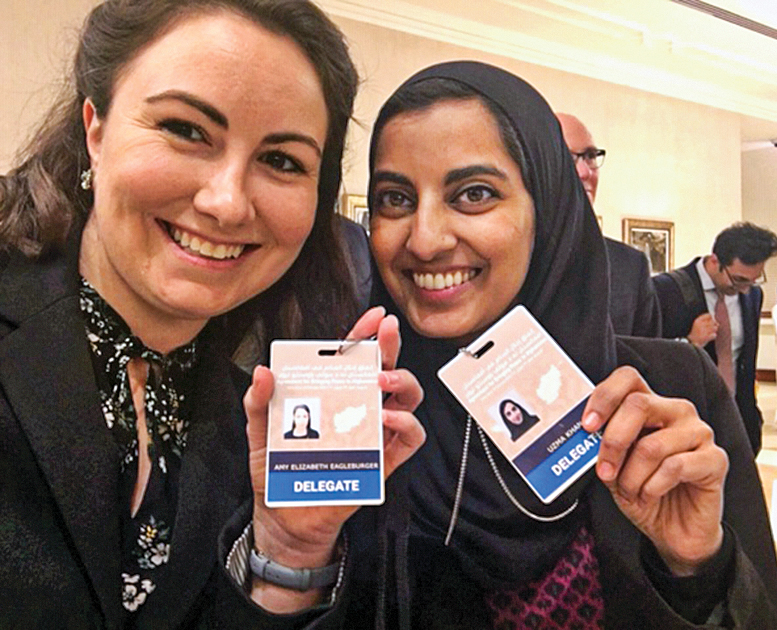A Front Row Seat to Peace
Posted on July 23, 2020
“You want to travel, you want to be out there. You want a job that has the kind of consequence and influence that our jobs have,” Amy Eagleburger ’08 says about those drawn to the U.S. Foreign Service. (Contributed photo)
After more than 18 years of war between the U.S. and the Afghan Taliban, negotiators on Feb. 29 reached an uneasy accord. If not quite a leap, given the day, it was at least a big step toward peace.
“The United States and the Taliban have endured decades of hostility and mistrust. Previous talks have faltered,” Secretary of State Mike Pompeo said that day in Doha, Qatar. “The negotiation process in Doha, with all of its twists and turns, has shown it is possible for us to take this step together.”
A few minutes later, Ambassador Zalmay Khalilzad, the U.S. special representative for Afghanistan Reconciliation, sat on a dais a few feet from senior Taliban commander Abdul Ghani Baradar. As cameras flashed, the two men signed a peace deal that had seemed impossible for most of the past two decades, shook hands and left the stage.
Amy Eagleburger ’08 was there that day, seated not far from the stage, between Khalilzad’s wife and his bodyguard. She knew all about the diplomatic twists and turns Pompeo referenced. For more than a year leading up to the ceremony, Eagleburger was special assistant to Khalilzad as he shuttled among Washington, Kabul, Brussels, Moscow and more than a dozen other cities, trying to bring America’s longest war to a close.
“It was one of the hardest, most rewarding jobs of my career,” said Eagleburger, who has been a Foreign Service officer since graduating from Carolina. “On some level, I wonder if it’ll be possible to top this last year, ending with a peace agreement with the Taliban.”
That’s saying a lot from someone whose diplomatic career already has included postings in Nicaragua and Moscow, and a stint helping manage investment policy in South Asia. Eagleburger speaks Spanish, Russian “and a little bit of Dari — just some basic phrases,” picked up on her frequent Afghan visits. Besides sitting alongside Khalilzad during formal sessions with Taliban negotiators, Eagleburger spent a lot of time visiting civil society groups in Afghanistan, especially women’s advocates and others worried about what a reduction in the international military presence will mean.
“We needed to know what they wanted to see from the Taliban, what they were especially concerned about,” she said.

Eagleburger, second from left, at the Doha ceremony with Afghan leaders, including former President Hamid Karzai, front row center, and to his right, Zalmay Khalilzad, U.S. special representative for Afghanistan Reconciliation, and U.S. Ambassador John Bass. (Contributed photo)
It was just one part of an incredibly intricate series of discussions, all with the goal of reducing violence in Afghanistan and drawing down American and NATO forces that have been there since 2001, when they invaded following the 9/11 terrorist attacks and drove the Taliban from power for harboring al-Qaida.
“I can’t tell you how many times we went over the same problems,” Eagleburger said. “But it was so clear that there was a commitment to get this done.”
That kind of intensive shuttle diplomacy is fascinating, occasionally dangerous and always exhausting. Eagleburger joked that managing travel logistics for the ambassador was a diplomatic achievement in its own right. “It was literally me on kayak.com figuring out how to get us from New Delhi to Berlin to Kazakhstan in 48 hours.”
Exhausting or not, State Department life tends to draw people with a strong wanderlust and a keen sense of duty.
“A lot of Foreign Service officers are kind of wandering souls, a little wild at heart,” Eagleburger said. “You want to travel, you want to be out there. You want a job that has the kind of consequence and influence that our jobs have.”
Work-life balance can be tough. Postings change every couple of years, and younger officers have little control over their assignments. “But that’s the tradeoff for getting to live in some truly beautiful, interesting places,” Eagleburger said.
After some time back in Washington to brush up on her Russian — “refining my grammar and topping up my vocabulary” — she’s headed for a posting in Dushanbe, Tajikistan. That’s about 280 miles north of Kabul and about 7,000 miles from where Eagleburger attended high school in Huntersville.
“When you go overseas and represent the United States, you start to feel even more American,” she said. “I still get excited when I walk into a meeting room and see the placard for the United States of America, and that’s my seat!”

Eagleburger with Uzma Khan ’07, her successor as special assistant to Khalilzad. (Contributed photo)
One of Eagleburger’s long-term goals is to see more American women representing their country at the highest levels. Incoming classes of Foreign Service officers are about evenly split between men and women, but women tend to leave the service at higher rates. By the time they reach the senior ranks, their colleagues are mostly male. There are now affinity groups within the Foreign Service to help women and minority officers find mentors and seek out opportunities.
A female mentor convinced Eagleburger to apply for the special assistant job, and Eagleburger in turn helped convince another woman at State to take over as her replacement. “That’s the only way I would have gone for it,” Eagleburger said. “So recruiting and pushing people is something you really have to do.”
In yet another diplomatic twist, the officer taking over as special assistant to Khalilzad is also a Tar Heel — Uzma Khan ’07, now serving her 10th year with the State Department.
“There are a lot of Tar Heels in the Foreign Service,” Eagleburger said. “It means there’s usually somebody to wake up with you at 4 a.m. on the other side of the world to watch UNC beat Duke.”
— Eric Johnson ’08
Thanks for reading the Carolina Alumni Review
Carolina Alumni members, sign in to continue reading.
Not yet a member? Become one today.
